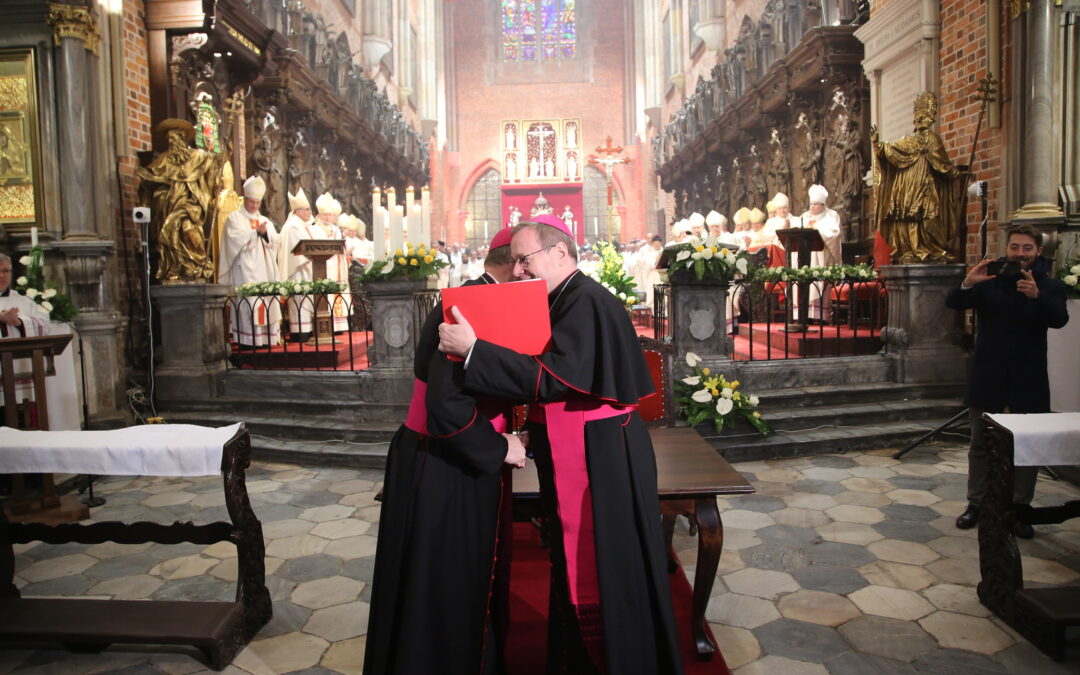Keep our news free from ads and paywalls by making a donation to support our work!

Notes from Poland is run by a small editorial team and is published by an independent, non-profit foundation that is funded through donations from our readers. We cannot do what we do without your support.
The Catholic bishops of Poland and Germany have issued a joint call for “Europe to stand united” and not give in to “fatigue” in the face of “the war being waged by Russia against Ukraine”.
They also appealed for continued reconciliation between Poland and Germany, condemning “political actors who exploit painful and historically unresolved issues”.
„Przebaczamy i prosimy o przebaczenie”. Ta szczera i pełna nadziei prośba nie należy do przeszłości. Kieruje nami również dzisiaj i musi być naszym programem także w przyszłości – czytamy w oświadczeniu przewodniczących Episkopatów Polski i Niemiec.https://t.co/pR1VdiVHRy pic.twitter.com/XKHPQOPgwx
— EpiskopatNews (@EpiskopatNews) November 18, 2025
The church leaders met in Wrocław this week to mark the 60th anniversary of a historic letter of reconciliation sent by Polish bishops to their German counterparts in 1965, saying that they “forgive and ask for forgiveness” in relation to the atrocities of World War Two.
In response, the German bishops wrote that they “grasp the hands offered” by their Polish counterparts and “ask for forgiveness from our neighbours”. They acknowledged that “terrible things have been done to the Polish people by Germans and in the name of the German people”.
The exchange sparked anger at the time from Poland’s communist rulers, whose propaganda presented West Germany as the country’s continued enemy. They accused the Polish bishops of betraying the national interest.
"We forgive and ask for forgiveness" is the most recognizable line from the Letter of Reconciliation of the 36 Polish Bishops to the German Bishops, sent on 18 November 1965.
It was a pivotal moment in post-WW2 relations between the Polish and German nations. pic.twitter.com/qoTHTIExEm
— Institute of National Remembrance (@ipngovpl_eng) November 19, 2025
As part of their gathering this week, the heads of Poland and Germany’s Catholic episcopates signed a joint declaration, expressing their desire to continue that process of reconciliation, not only between their two countries but also around Europe and the world.
“We see [the need for] this especially in the context of the war being waged by Russia against Ukraine,” they wrote. “We are convinced that Europe must stand united against violence. Practical solidarity with the victims of aggression and compassion for all victims of war are essential.”
“Now, when signs of fatigue are visible everywhere…we encourage our countries to take every possible action to ensure the survival of the Ukrainian people in this war, to end their suffering, and to contribute to the defence of fundamental values, such as life in freedom and dignity,” added the bishops.
In their statement, the church leaders also noted that “tensions still exist between our societies” over historical issues. They called for such matters to “be discussed in a way that fosters reconciliation rather than leads to reopening wounds”.
“It is not primarily about being right, but rather about understanding one’s neighbour and approaching the wrongs inflicted on others with empathy,” they wrote. “The process of reconciliation includes…a commitment to understanding, a sincere and truthful look at history, and a willingness to shape the future together.”
The bishops noted that “some political actors continue to attempt to exploit painful and historically unresolved issues for political gain”. Such “political games based on historical wrongs are contrary to the spirit of reconciliation”.
Germany's ambassador has told a member of the Polish opposition that their demands for Berlin to pay war reparations “create divisions that help only Putin”.
His comments sparked criticism, including from President Nawrocki's chief foreign-policy aide https://t.co/z76wvBPbbH
— Notes from Poland 🇵🇱 (@notesfrompoland) November 16, 2025
Their joint statement comes at a moment of increased recent tensions between Poland and Germany, including over historical issues.
This week, the latest version of a regular study, the Polish-German Barometer, showed that the proportion of Poles who say they dislike Germans has risen to its highest level in 25 years, while those who say they like Germans has dramatically declined in the last three years.
Among the most contentious issues is the question of war reparations, with Poland’s former national-conservative Law and Justice (PiS) government launching a claim in 2022 for $1.3 trillion in compensation from Germany. In response, Berlin maintained its long-standing position that the issue has already been legally settled.
Poland’s current, more liberal government has refrained from pursuing the reparations claim. But recently elected right-wing President Karol Nawrocki, who is aligned with PiS, renewed the demand during his first state visit to Berlin in September.
Last week, Germany’s ambassador to Warsaw stirred anger in Poland by declaring that PiS’s reparations claims stoke “divisions that help only Putin”. Earlier this month, one of the leaders of the far-right Alternative for Germany (AfD) claimed that Poland is as much of a threat to his country as Russia is.
Poles' attitudes towards Germans have significantly worsened in recent years, the latest version of a long-running study has found.
Only 32% of Poles now say they like Germans, down from 50% in 2022; and 25% dislike them, the highest figure in 25 years https://t.co/O6QoxChUSQ
— Notes from Poland 🇵🇱 (@notesfrompoland) November 20, 2025

Notes from Poland is run by a small editorial team and published by an independent, non-profit foundation that is funded through donations from our readers. We cannot do what we do without your support.
Main image credit: BP KEP

Alicja Ptak is deputy editor-in-chief of Notes from Poland and a multimedia journalist. She has written for Clean Energy Wire and The Times, and she hosts her own podcast, The Warsaw Wire, on Poland’s economy and energy sector. She previously worked for Reuters.



















